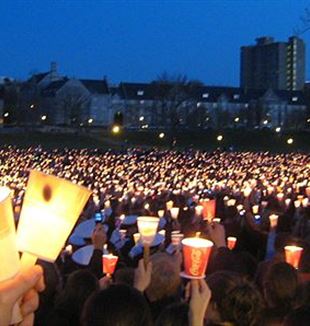
Reason in the Face of Tragedy
It’s been weeks since the sordid events at Virginia Tech filled newspapers and television screens. Though the media’s reporting of the particulars has waned, our hearts’ demand for meaning has not.I have been studying at Virginia Tech for a year, having come from the University of Lugano in Switzerland. It was campus life like anywhere else, spent immersed in studies and the academic routine, but shared with a group of friends: Rana, my roommate; Edo, Massi, and Giancarlo, Italian doctoral students; and Drew, an American engineering student. Then, one April morning that seemed like any other, we lived together what Pope Benedict XVI called “a senseless tragedy.” An armed student entered some classrooms and shot at students, killing 32 people and then taking his own life.
Common denominator
The peaceful university town of Blacksburg was literally turned upside down by an unprecedented tragedy. In the days and weeks that followed, the students reacted in greatly differing ways: keeping occupied so as not to think about what happened, seeking a rational explanation in newspapers, or else asking for answers from psychologists. The common denominator I saw among all these actions was the search for the true meaning of this tragedy–a meaning that could not be faced with a psychological or sociological reason that reduced the complexity of this event to comprehensible rational factors. In front of a tragedy of these proportions, no rational explanation whatsoever can satisfy the demand for total meaning that all hearts are yearning for.
Part of a community
The entire VT community was immediately reborn, on the basis of this evident powerlessness and from the knowledge of being united in front of a “senseless tragedy.” Students and professors discovered themselves part of the same “VT family,” helping each other and staying united, organizing memorial services, creating thousands of initiatives aimed at keeping the memory of the victims alive. Someone placed 32 stones with the names of the victims on Drillfield. There wasn’t a moment in which someone wasn’t there to lay down a flower or say a prayer. My friends and I never felt such a part of this community as in those days.
Something beyond
Yet, at the same time, I recognized a risk in such an attitude. Drew was particularly struck by the fact that in the thousands of memorial initiatives, the word “God” was never pronounced aloud as The response to this tragedy. The phrase repeated most frequently was “We are Virginia Tech. We will prevail,” but such a response was unable to satisfy the demand for complete meaning the heart was yearning for. Within that situation, I started to understand that the community can either suffocate the question of the heart of man by ignoring it or furnishing an easily understood yet unsatisfying response, or else it can help us to be ever more aware of this “presentiment of something beyond our own situation” (L. Giussani. The Journey to Truth is an Experience. Montreal: McGill-Queens University Press, 2006, p. 57) and to keep sustaining this question about the meaning of the whole experience. This is how waiting becomes prayer.
A new friendship
This is the level at which, in the days following that April morning, my friends and I attempted to face the tragedy, even if in a partial and gap-ridden way, speaking together about the flyer proposed by the CLU students in New York, attempting to organize some meetings, trying to judge together what we saw happening here, and trying to give birth–from a tragic affair–to a new friendship.